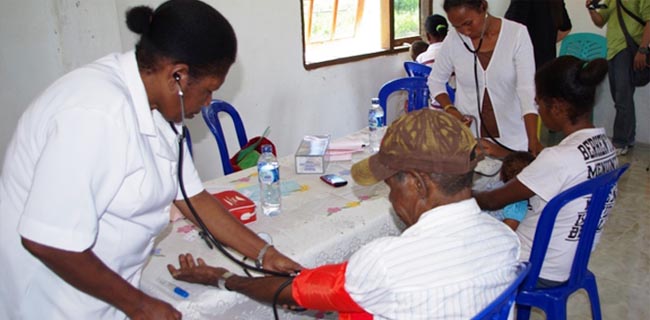Government Continues to Continue Health Services in Papua
By: Andrianus Lokbere)*
The Indonesian government continues to improve health services in Papua. One way to do this is by meeting the needs of regional health workers and increasing hospital capacity.
Kirana as Expert Staff of Health Decentralization said the government wants all Papuans to have access to quality health services. His party supports the realization of a healthy Papua, not only for infants and children but also for adults in an effort to increase productivity to support other development pillars.
Kirana also feels called to accelerate development in the health sector in Papua so that it is on par with other provinces in Indonesia. He also highlighted the importance of preparing the Master Plan for the Acceleration of Development (RIPP) for Papua for the period 2022-2041 which includes development in the health sector.
There are two indicators used to determine the success of human resource development, namely the human development index and life expectancy, which are part of development interventions in the health sector.
Currently, the Government is formulating the Master Plan for the Acceleration of Development for Papua (RIPP) for 2022-2041. Plans for accelerating development in Papua are being formulated by involving central and local government agencies as well as community leaders.
RIPP Papua Year 2022-2041 was prepared with reference to Law Number 2 of 2021 concerning Special Autonomy for the Papua Province and Government Regulation Number 107 of 2021 concerning acceptance of management, supervision and master plan for accelerated development in the implementation of Special Autonomy for Papua Province.
Meanwhile, according to data from the Papua Provincial Health Office, it is alleged that the Puskesmas in Papua still lacks about 60% of doctors. From the latest data revealed, only about 40% of doctors are active from as many as 270 health centers in regencies/cities throughout Papua.
This means that health services in both rural and rural areas have not been carried out optimally by the Regional Government, both provincial and district/city. Because of the 270 Puskesmas in Papua, there are around 100 more Puskesmas that have not been handled directly by doctors. This is certainly ironic and worrisome, because in the past few weeks, many cases of illness have arisen, some of which have even lost their souls.
On a different occasion, the Governor of Papua Lukas Enembe emphasized to the District/City Health Office in an effort to improve health services tailored to regional characteristics and is expected to be able to reach all people in Papua Province.
Assistant for Administration for the Regional Secretariat of Papua Province, Doren Wakerwa, said what Luke Enembe wanted. Lukas wants the range of health services to include free counter registration, free doctor’s examinations, free laboratory examinations and referral services according to health service standards to all Papuan people.
Doren explained, what should be a concern are health workers at the Puskesmas, Health Office, Hospitals and health education institutions to provide health services in accordance with educational backgrounds ranging from doctors, pharmacists, nurses, midwives and others.
In facing the challenges of future health development in the era of globalization or world trade liberalization, it is necessary to change the paradigm of indigenous peoples development as the main target of health services in Papua.
Doren said that doctors, nurses, pharmacists, laboratory analysts, nutritionists and others must be smart and professional in managing health service centers consistently using the service standard criteria that have been set.
He added that in formulating policies, programs and activities for health development at Puskesmas, hospitals and their networks in Papua Province, apart from referring to the national health system, it should be directed to aspects of taking sides, protecting and empowering indigenous peoples.
Previously, the Indonesian Institute of Sciences said maternal and child health services for indigenous Papuans, especially in West Papua Province, require increased availability and access to services and skilled resources as well as health education for local residents. Moreover, the health of mothers and children is one of the benchmarks for the creation of a quality future generation.
Health services in Papua are something that needs special attention, especially since the number of health workers is still far from sufficient, it seems that the government needs to provide special autonomy scholarships for Papuan children who want to become health workers on Earth Cenderawasih.
)* The author is a Papuan student living in Semarang
